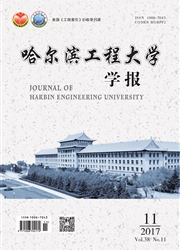

 中文摘要:
中文摘要:
浅海环境背景下由于空-时采样不充分、介质的空时变化性,海洋环境参量通常是不确知的,由此驱动数值传播模型得到的拷贝声场也是不确实的,从而导致基于拷贝声场和测量声场作拷贝相关处理的最小方差匹配场波束形成性能下降.针对上述问题,利用NRL Workshop′93提供的典型浅海不确实海洋环境,以不确实情况下定位偏置、不确实时与确知时模糊度表面主瓣峰值比、主瓣背景比3个量为性能度量,量化分析了宽带最小方差匹配场波束形成的性能对水体声速、海深等8个环境参量不确实性的灵敏性.经对环境参量失配的全面量化分析,结果表明:海深、水体声速是最敏感参量,沉积层声速次之,其他参量的灵敏性最弱.
 英文摘要:
英文摘要:
Minimum variance matched-field beamforming(MV-MFBF) is the correlation of a measured acoustic field and a predicted acoustic field which is generated through a propagation model derived by environmental parameters.The environmental parameters in shallow water are usually uncertain,due to insufficient spatial and temporal samples of the parameters and the spatiotemporal variability of the medium,resulting in an uncertain predicted acoustic field and in the decreased performance of minimum variance matched-field beamforming.Based on the typical shallow water environmental benchmark set by the NRL Workshop′93,the performance sensitivity of broad-band MV-MFBF to 8 oceanic environmental parameters(water sound speed,waveguide depth,etc.) was discussed.The performance was measured quantitatively by three parameters: the location bias,the ambiguity surface peak of an uncertain case to a peak of a certain case ratio,and the peak to background ratio of the ambiguity surface.The results show that water sound speed and waveguide depth are the most sensitive parameters.Sediment sound speed is less sensitive,and other parameters such as sediment density are the least sensitive.
 同期刊论文项目
同期刊论文项目
 同项目期刊论文
同项目期刊论文
 A demonstration of equivalence between parameter-induced and noise-induced stochastic resonances wit
A demonstration of equivalence between parameter-induced and noise-induced stochastic resonances wit 期刊信息
期刊信息
